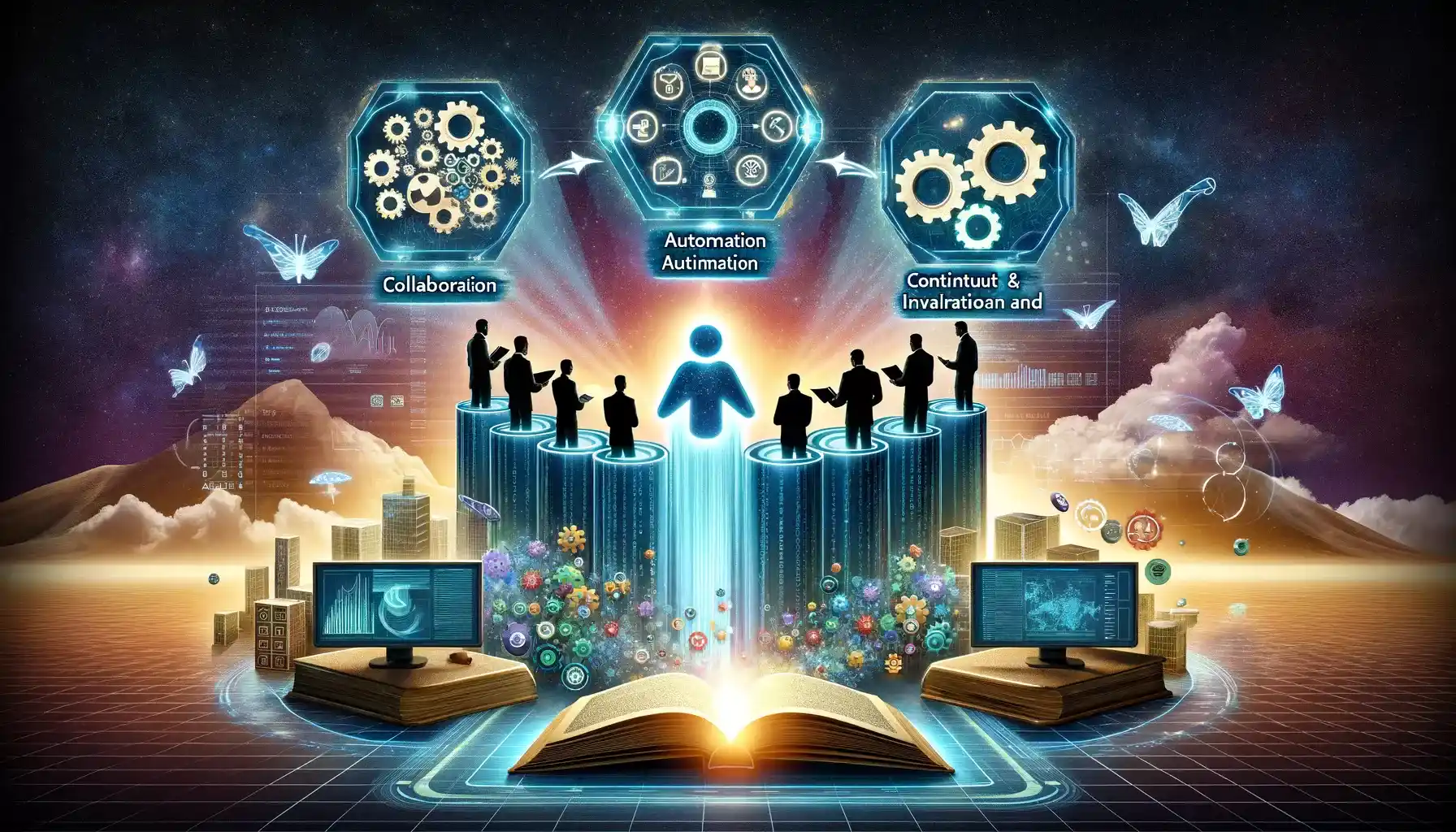Table of Contents
DevOps transcends the collaboration of development and operations; it embodies a profound cultural shift and mindset. It’s a paradigm where teams embrace innovative methodologies. Developers delve deeper into user insights, grasping requirements intimately. Operations actively engage in the development, infusing maintenance, and customer-centric perspectives.
Central to this ethos are key principles driving accelerated delivery and elevated quality. By adhering to these tenets, DevOps principles in teams outpace traditional models in deploying applications and services. DevOps isn’t just about tools; it’s a holistic approach fostering synergy among diverse functions.

It’s about fostering agility, resilience, and continuous improvement. Ultimately, it’s a transformative journey, shaping how software is built and deployed and how organizations operate and thrive in today’s dynamic landscape.
History of DevOps
The DevOps movement emerged circa 2007, spurred by concerns within the IT operations and software development communities regarding the limitations of the traditional software development model. Although agile methodologies had gained traction among development teams, fostering improved collaboration, there remained a significant divide between developers and operations teams.
This disjointed approach led to inefficiencies and a dearth of collaboration. Enter DevOps: a solution designed to unify these disparate teams, fostering cohesion and synergy. By integrating the skills, processes, and tools of both development and operations, DevOps streamlines workflows, enhances communication, and accelerates software delivery.
It represents a paradigm shift towards a more holistic and collaborative approach to software development and deployment, ultimately driving greater efficiency and innovation within organizations.
Benefits of DevOps
DevOps Principles encompass three key categories of benefits: technical, cultural, and business. In the realm of technology, DevOps fosters reduced complexity, facilitates continuous delivery, and accelerates problem resolution, enabling practitioners to deploy superior code swiftly. Culturally, teams become more productive and efficient, leading to heightened customer satisfaction.
From a business perspective, DevOps promotes greater collaboration and trust among team members, culminating in expedited delivery and the establishment of stable operating environments. By adhering to DevOps Principles, organizations not only streamline their technical processes but also cultivate a culture of collaboration and trust, ultimately driving enhanced efficiency and customer satisfaction while achieving business objectives with agility and precision.
DevOps culture
DevOps Principles embody a profound cultural shift within teams, fostering a software engineering ethos that integrates operational considerations on par with architecture, design, and development.
This paradigm empowers developers to not only build but also operate software, enhancing their comprehension of user requirements. Central to this ethos are values like heightened transparency, communication, and collaboration across teams.
By embracing DevOps Principles, organizations transcend traditional silos, fostering a holistic approach that drives innovation and agility. This cultural transformation paves the way for streamlined workflows, efficient toolsets, and a shared responsibility for delivering high-quality, customer-centric solutions.
Ultimately, DevOps Principles champion a collaborative mindset where every team member contributes to the continuous improvement and success of the software delivery lifecycle.
5 Key DevOps principles

Collaboration
DevOps revolves around the central tenet of collaboration, uniting development and operations teams into a cohesive unit that fosters continuous communication, feedback exchange, and joint effort across the development and deployment spectrum. Typically, this amalgamation results in a unified team that traverses the entire application lifecycle seamlessly.
Within a DevOps setup, team members are responsible for ensuring top-notch deliverables across all product aspects. This often translates into a shift towards ‘full stack’ development, wherein teams take ownership of end-to-end backend-to-frontend responsibilities for features or products.
With teams shepherding features or projects from inception to delivery, their heightened sense of involvement invariably translates into elevated output quality.
Automation
One fundamental practice within DevOps is the extensive automation of the software development lifecycle, liberating developers to focus on coding and innovation. This automation, pivotal in a CI/CD pipeline, mitigates human errors and amplifies team efficiency. By embracing automated workflows, teams unlock continuous improvement, characterized by swift iteration cycles enabling rapid responses to customer input.
Continuous Improvement
Continuous improvement, a cornerstone of agile methodologies and lean manufacturing, along with Improvement Kata, prioritizes experimentation, waste reduction, and optimization for speed, cost, and delivery simplicity. This ethos aligns closely with continuous delivery, enabling DevOps teams to perpetually enhance software systems by regularly deploying updates.
Through this iterative process, teams systematically eliminate inefficiencies, enhance development effectiveness, and deliver greater customer value. The continuous pipeline of releases ensures ongoing refinement, fostering a culture of innovation and responsiveness within DevOps environments.
Customer-centric action
DevOps principles emphasize the use of short feedback loops with customers and end users to develop products and services that align closely with user needs. Through DevOps practices, teams facilitate rapid collection and response to user feedback by leveraging real-time live monitoring and swift deployment strategies.
This approach grants teams immediate visibility into user interactions with software systems, empowering them to make informed decisions and implement continuous improvements. By adhering to DevOps principles, teams cultivate a culture of agility and responsiveness, ensuring that their products evolve in sync with user demands.
Create with the end in mind
One of the fundamental DevOps Principles revolves around customer-centricity, emphasizing the importance of comprehending customer needs and developing solutions that address genuine issues. It discourages the practice of isolated development, urging teams to avoid creating software in a vacuum. Instead, DevOps teams are encouraged to cultivate a comprehensive understanding of the product lifecycle, from its inception to deployment.
By adopting this principle, teams can align their efforts with the end-user’s requirements, fostering collaboration and ensuring that the resulting products or services effectively meet the consumers’ needs. This customer-focused approach lies at the heart of DevOps Principles, driving innovation and delivering value to stakeholders.
What is the core principle of DevOps?
DevOps integrates collaboration, automation, and continuous improvement, transforming software development and delivery with streamlined workflows, enhanced efficiency, and perpetual innovation.
What is the first principle of DevOps?
Continuous Integration (CI) accelerates software development by automating code integration and testing. It facilitates early bug detection, minimizing error resolution time, and expediting software release cycles.

What are the 7 principles of DevOps?
DevOps orchestrates a seamless software delivery lifecycle across seven key phases: Planning, Development, Testing, Integration and Deployment, Monitoring and Feedback, Operations, and Continuous Feedback and Improvement. This holistic approach ensures efficient collaboration, automation, and continuous enhancement, empowering teams to deliver high-quality software rapidly and responsively.
What is the golden rule of DevOps?
The cornerstone of DevOps is automating development, testing, configuration, and deployment processes, freeing specialists from repetitive tasks. This streamlines workflows boosts efficiency, and enables teams to allocate more time to tasks requiring human intervention. By adhering to this golden rule, DevOps fosters innovation and accelerates delivery while ensuring that human expertise is maximized where automation isn’t feasible.
What is DevOps full form?
DevOps merges development and operations through practices and tools aimed at accelerating application and service delivery. It enhances organizational agility, enabling faster releases compared to traditional development methods. This approach emphasizes collaboration, automation, and continuous improvement to streamline workflows and enhance efficiency throughout the software development lifecycle.
Who is the father of DevOps?
DevOps was first founded by Patrick Dubois who is regarded as the father of DevOps.
What is the DevOps lifecycle?
The DevOps lifecycle is a collaborative, iterative process combining automation and feedback to deliver top-tier software. It encompasses planning, coding, testing, deployment, monitoring, and feedback phases. Teams collaborate seamlessly across these stages, leveraging automation to streamline workflows and continuously incorporating user feedback. This approach ensures the timely delivery of high-quality software aligned with both business objectives and user needs.
Conclusion
In conclusion, the essence of DevOps principles lies in fostering a culture of collaboration, automation, continuous improvement, customer-centric action, and creation with the end in mind. These principles form the bedrock of a transformative approach to software development and deployment, uniting teams, processes, and technologies to deliver value seamlessly and efficiently.
By prioritizing collaboration, DevOps breaks down silos between development and operations, facilitating open communication and shared responsibility. Automation streamlines workflows, enabling teams to focus on innovation and delivering quality products swiftly. Continuous improvement drives iterative enhancements, ensuring that software evolves in alignment with user needs and market demands.
Moreover, DevOps principles underscore the significance of customer-centric action, advocating for short feedback loops and responsiveness to user input. This customer-focused approach ensures that products and services meet genuine needs and drive meaningful outcomes. Finally, creating with the end in mind emphasizes the importance of holistic understanding and alignment with the end-user journey.
In essence, DevOps principles empower teams to deliver value consistently, adapt to change efficiently and drive innovation relentlessly. By embracing these principles, organizations can cultivate a culture of excellence and agility, positioning themselves for sustained success in an ever-evolving landscape.